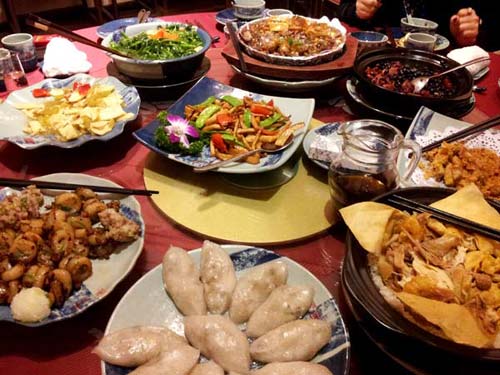当前位置: Language Tips> 双语新闻
Home-style cuisine packs a punch in warmth of family gathering

|
Hakka people often find excuses for the lack of presentation for their food, especially compared with their seafood-rich neighbors of Chaozhou and Shantou, where more attention is paid to how dishes are prepared and presented. For an outsider like me, it is in this area that Hakka food stands out. It may not be the best-looking cuisine in the vast array of Chinese gastronomy, but it is surely a strong contender for the best tasting. It reminds one of the kind of food a mother cooks for her child who is visiting after a long absence from home. The Hakka idea of feasting is mostly meat. Its salt-roasted chicken has been incorporated into Cantonese cuisine as a standard. The origin of bean curd stuffed with a small meatball goes back to the time before the Hakka moved away from the Central Plains. Unlikely as it seems, this famous dish is a variation of jiaozi, but since wheat was hard to come by in South China, the Hakka had to make do with tofu. Like its dialect, the Hakka cuisine has traces of their connection to the landlocked north. The emphasis on meat could be a testament to hard times when meat was a luxury and reserved for only the rarest of occasions. But dishes like pork with salted vegetables have gained popularity across the nation. It is, however, pork tripe stewed chicken, among the Hakka staples, that was relatively unknown to me and it proved to be delicious beyond description. Vegetarians need not despair. Traditionally, much of the Hakka diet is sourced from the earth. It might have been out of necessity, but it has been honed into a culinary art. Tell your host that you prefer a healthy portion of vegetarian food and you'll be surprised at the variety that will greet you and your palate. The most dramatic part of my trip to Meizhou involved a snack called yanmian, literally pickled noodle. Filmmaker Zhang Yibai, known for his epicurean knowledge, texted us about a noodle shop in downtown Meizhou that had impressed him a year earlier. Our host called every one of his friends and nobody had heard of this place. One night, after we already had dinner and a midnight snack, we were driving around that area and stumbled upon the extremely inconspicuous stall. We ordered one full portion for everyone - yanmian noodle complete with another bowl of fish soup. Xue Xiaolu, director of Finding Mr Right, ended up ordering one more full serving. That night, I texted a good friend of mine in the United States, whose hometown is Meizhou, about this noodle shop and he replied: "Yanmian is available at every snack stand." Never predict the flavor of food served by the glamour of the venue, or lack thereof. Last but certainly not least is Mama's Red Wine, which is my personal translation of "niang jiu" (niang means mother). It is similar to many local Chinese brews but much sweeter. Distilled from sticky rice and well water, it is traditionally brewed by the matriarch of the household. Nowadays there are plenty of brands and they vary slightly in taste. But invariably they remind me of red wine made from grapes. One sip and I'm transported to the land of hospitality where people may have endured much hardship but have retained their friendly nature. By Raymond Zhou ( China Daily ) |
跟海味十足的潮州菜和汕头菜比起来,客家菜显得有些默默无闻,前两者食材讲究,制作精良,上菜时摆盘也很精美,而客家菜却不怎么讲究这些,这样说来,默默无闻也就情有可原了。 可是在我这个外人眼中,客家菜也正因此才变得引人注目。在中国的各色菜系中,客家菜不是最有卖相的,但是其味道绝不输给任何菜系。品尝客家菜,会让你想起母亲的味道,一道道菜就像是母亲为远游归来的孩子烹饪的美食。
这次的梅州之行中最让我兴奋的应该是吃到了腌面。电影导演张一白,是出了名的美食家,发短信告诉我们梅州市中心有一家面馆,一年多以前他在这里吃过一次,非常好吃。我们的主人打电话问了他的所有的朋友,居然没有人听说过这家店。一天晚上,我们吃过了晚饭和夜宵,开着车在城里瞎转,偶然发现了这个非常不显眼的小摊。我们每人都点了一份套餐——一碗腌面加一碗鱼汤。《北京遇上西雅图》的导演薛晓璐吃完后又点了一份。
(中国日报周黎明) (译者 EllaQ 编辑 丹妮) |
上一篇 : 巴黎的出租车大战
下一篇 : 泰国大选提前投票受阻 当局寻求收复被占领区域
关注和订阅


电话:8610-84883645
传真:8610-84883500
Email: languagetips@chinadaily.com.cn